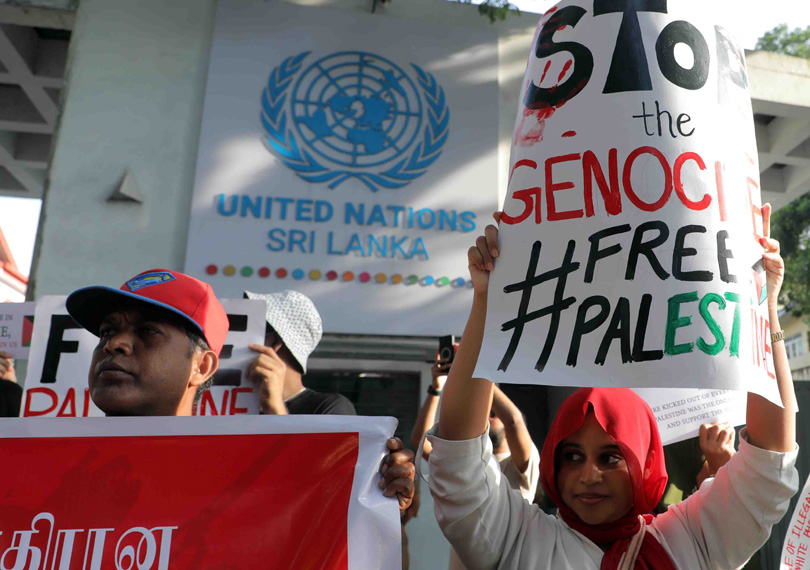
Photograph: Sunday Times
Nalin Jayathunga, a Sri Lankan researcher, wrote on how “protesting the genocide currently unfolding in Gaza” made them question their own position “with reference to violence perpetrated by the Sri Lankan State against the Tamil population”.
Extracts have been reproduced below.
Read the full piece here.
“If one imagines witnessing both the Palestinian and Tamil genocides at similar periods, can most of us in the South of Sri Lanka, who are outsiders to violence on the scale experienced in the North and East, denounce the occupation of Tamil lands, genocide, massacre, and ethnic cleansing of Tamils in the same breath we denounce Israel’s occupation, genocidal acts, and ethnic cleansing of Palestinians? Can the Sinhala Buddhist majority acknowledge the significations of the word ‘genocide’ in the context of the killing and maiming of Tamils?. Further, in the South, it is impossible to even debate the ‘armed resistance’ of the Liberation Tigers of Tamil Eelam (LTTE) as one would do in the case of Hamas, Houthis, and Hezbollah. If we cannot accept the Tamil fight for liberation on the same terms we support Palestinian liberation, it raises the question of whether our solidarity towards Palestine is only performative and limited to a digital space. In order to build more meaningful transnational solidarity with the Palestinian cause, it is necessary to draw parallels between different contexts of violence and address our positionalities, ethics, subjectivities, and deeply entrenched biases.”
“In Sri Lanka, while I have tried to understand how majoritarianism and ethnonationalism have long stifled minority communities, and have always considered myself an ‘ally’ to the struggles of the Tamil and Muslim population, it is only my fixation with Palestinian liberation that shockingly awakened the inner moral conundrum: “Am I A Settler Too?” I am from an urban middle-class, majority Sinhala-Buddhist ethnic and religious background. In Colombo, people were jubilant over the war ‘victory’ in 2009, aided in no small measure by the discursive and material space that the media, politics of memory, and even the education system relentlessly worked towards creating and maintaining (Perera 2016; Saravanamuttu 2022; Karunanayake 2021). At present, the similarities between the Palestinians’ suffering and the oppression of Tamil and Muslim communities in Sri Lanka, Kashmir Muslims in India, Balochs in Pakistan, and many more are becoming glaringly clear."
“Although this suffering in South Asia has deep connections to Western colonial history, we must admit the role of majoritarianism in post-colonial South Asia in the continued practices of occupation, land grabbing, militarisation, violence, surveillance, and State repression. While it is fairly easy to be witness to the genocide in West Asia without guilt, is it possible to say the same about one’s own context of violence? Have the occupation of Tamil lands in Sri Lanka, militarisation, ethnic cleansing, and the genocide of Tamils become normalised to the majority in the South of Sri Lanka through State-led processes of erasure, denial of memorialisation, and censorship?”
